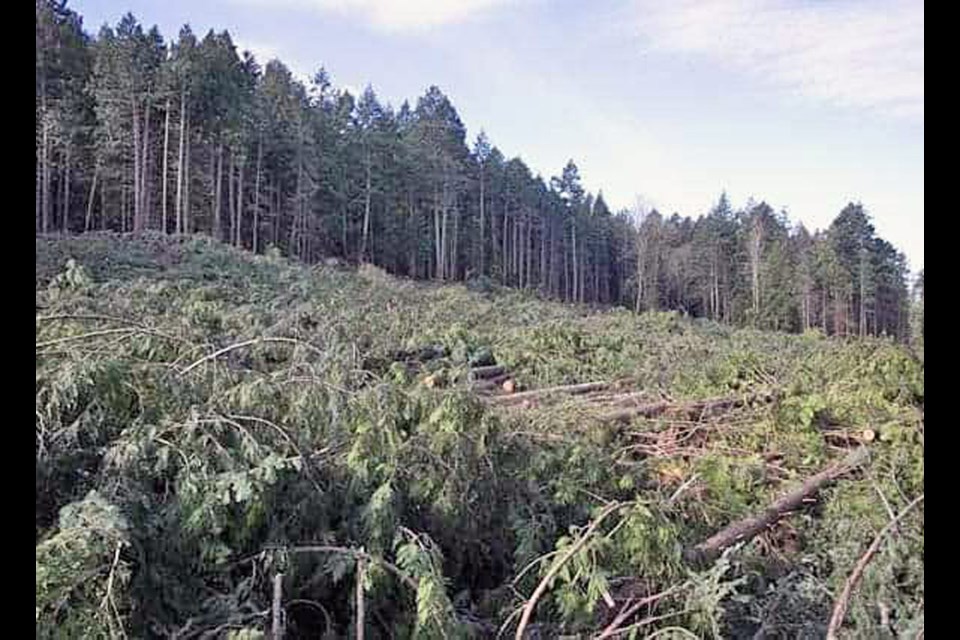The loggers moved into Saturna Island three weeks ago, and began clear-cutting a big swath of land bordered by the national park. This caused a bit of an uproar among the 350 permanent residents of Saturna.
No surprise there. People in the southern Gulf Islands — an area deemed so magical that the government set up the Islands Trust to protect it in 1974 — have a keen sense of place. From Galiano’s Matthews Point to Mayne’s Helen Point and Salt Spring’s massive struggle with the Texada Land Corp., local history is punctuated by chainsaw conflicts.
There’s opposition from another quarter, too: within the two Saanich Peninsula First Nations that have contracted with Chemainus Forests Products to log the Saturna reserve they share. On the weekend, a handful of members of the Tsawout band plunked themselves on the logging equipment in protest.
Monday morning found Tsawout councillor Mavis Underwood on the ferry to Saturna to listen to three dissident members and present the council’s side. She argues the Tsawout and Tseycum were right to bring in the loggers, who have cleared roughly a third of the 146-hectare reserve the two First Nations share as unoccupied hunting and fishing territory.
Built-up ground cover had made the land hard to walk around, she said. Bug infestations, worms and root rot have taken hold.
Mostly, though, the Tsawout need the revenue the logging will earn, money that will build a new big house, a year-round cultural hub that will also earn income. Homes that have fallen into disrepair need to be replaced. “This, for us, is an important project,” Underwood said.
Many of the 900-plus Tsawout are squeezed onto a Saanichton Bay reserve shared with several hundred non-members. There’s no overflowing commercial revenue stream, no potential to grow. “We are revenue- and land-poor.” Two-thirds of the band’s members are under age 30. They need a future.
That leaves the Saturna reserve, jointly held with the 200-member Tseycum band of Patricia Bay. “We would love to have pristine land that’s just there for hunters, but we need an economy, too,” Underwood said.
Not good enough, says the area’s MLA, the Green Party’s Adam Olsen. As a member of the nearby Tsartlip First Nation, he has compassion for leaders who are doing the best they can with the few options they have, but as an environmentalist, he still opposes what they’re doing.
“It doesn’t matter who has been logging unsustainably, we have to embrace a more sustainable approach,” he said. “I have so much empathy for the challenges they face, but I must be consistent in my criticism of policies that damage ecosystems.”
Here’s what else he believes, though: He’s wary of what he calls “settlersplaining” — non-Indigenous people trying to tell Indigenous people about Indigenous values, draping them in their own expectations. There’s a history of left-wing white boys (these are my words, not Olsen’s) noisily advocating for Indigenous self-determination, just as long as the Indigenous people stick to a path approved by left-wing white boys.
A pigeon-holing takes place. It’s true that environmentalists and Indigenous people have long found themselves standing on the same sides of issues, Olsen says, but … .
“I think there’s a pretty dangerous assumption that everyone’s standing there for the same reason.” They’re not.
Yes, Olsen believes Indigenous people have a special connection to the natural world, but they also must consider factors that environmentalists don’t. Olsen sees more separation coming. “There’s going to be a lot more of that conflict.”
Underwood returned from Saturna talking about hoping to convene a Tsawout community meeting before logging resumes, one where members can talk about the process for deciding to log and where the money will go. Maybe the band will decide against doing the last two phases of the three-phase project.
Not finishing phase one (it’s about two-thirds done) would cost the Tsawout money, though, as they would have the full expense of the logging contract to cover without benefiting from all the expected timber revenue. On the other hand, when Underwood gazed above the devastation of the logged-off site Monday, she saw a couple of eagles soaring and wondered if they were looking for a nest in a tree that no longer stands.
These decisions aren’t easy.



